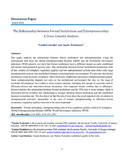Citation link:
http://dx.doi.org/10.25819/ubsi/9634Files in This Item:
| File | Description | Size | Format | |
|---|---|---|---|---|
| The_relationship_between_formal_institutions_and_entrepreneurship.pdf | 468.11 kB | Adobe PDF |  View/Open |
| Dokument Type: | Preprint | metadata.dc.title: | The relationship between formal institutions and entrepreneurship | Title addition: | a cross-country analysis | Authors: | Tsatsenko, Natalia Ibrahimova, Ganira |
Institute: | Fakultät III - Wirtschaftswissenschaften, Wirtschaftsinformatik und Wirtschaftsrecht | Free keywords: | Formal institutions, Entrepreneurship, Rule of law, Regulatory quality, Control of corruption, Global Entrepreneurship Monitor (GEM), World Governance Indicators (WGI), Formale Institutionen, Unternehmertum, Rechtsstaatlichkeit, Regulatorische Qualität, Korruptionskontrolle, Global Entrepreneurship Monitor (GEM), Welt-Governance-Indikatoren (WGI) | Dewey Decimal Classification: | 330 Wirtschaft | GHBS-Clases: | QAA | Issue Date: | 2021 | Publish Date: | 2021 | Abstract: | This paper explores the relationship between formal institutions and entrepreneurship. Using the international data from the Global Entrepreneurship Monitor (GEM) and the Worldwide Governance Indicators (WGI) projects, we show that formal institutions have a different impact on early-established and mature entrepreneurial activity rates. The relationship between formal institutional dimensions (rule of law, control of corruption, regulatory quality) and two entrepreneurial activity rates (total early-stage entrepreneurial activity and established business ownership rates) are estimated. We theorize that formal institutions create necessary conditions where both early established and mature entrepreneurship operate. Since entrepreneurship depends not only on the institutional environment but also on the stage of economic development, we conduct a cross-country analysis, including two groups of countries such as efficiency-driven and innovation-driven economies. Our empirical results confirm that in efficiency-driven countries the relationship between formal institutions and the TEA rate is more intense, while in innovation-driven countries this relationship is stronger between formal institutions and the established business ownership rate. We also discover that the rule of law plays the most important role in relation to entrepreneurial activities, meanwhile in the case of mature entrepreneurship in efficiency-driven economies; regulatory quality turns out to be more important. |
DOI: | http://dx.doi.org/10.25819/ubsi/9634 | URN: | urn:nbn:de:hbz:467-18643 | URI: | https://dspace.ub.uni-siegen.de/handle/ubsi/1864 | License: | http://creativecommons.org/publicdomain/zero/1.0/ |
| Appears in Collections: | Publikationen aus der Universität Siegen |
This item is protected by original copyright |
Page view(s)
607
checked on Nov 24, 2024
Download(s)
362
checked on Nov 24, 2024
Google ScholarTM
Check
Altmetric
This item is licensed under a Creative Commons License


